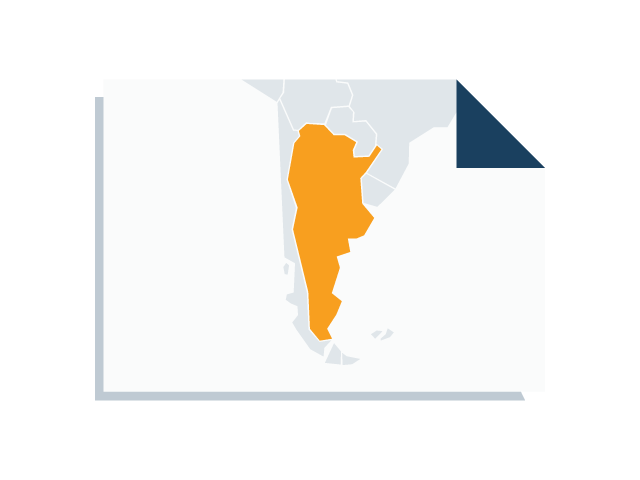AVERAGE SCORE
35READINESS AVERAGE
47IMPLEMENTATION AVG
37IMPACT AVERAGE
23This regional snapshot covers the 15 Latin American countries assessed in the fourth edition of the Barometer. Four new countries have been added since the third edition of the Barometer: Bolivia, El Salvador, Panama and Paraguay.
General regional highlights and findings
Regional leaders — Mexico, Uruguay, Colombia and Brazil — extended their edge over the rest of the region in this edition of the Barometer. This group also significantly increased the impact they are delivering through open data. Argentina and Paraguay, rising 14 places and nine places respectively, also showed good progress.
Meanwhile, Ecuador (down 25 places) and Costa Rica (down 27) have both fallen dramatically, mostly due to a lack of sustained political support to deliver their initial open data commitments.
Regional Ranking
| Global Rank | Score | Country | Readiness | Implementation | Impact |
|---|---|---|---|---|---|
| 11 | 73 |
 Mexico
Mexico
|
83 | 58 | 88 |
| 17 | 61 |
 Uruguay
Uruguay
|
75 | 64 | 38 |
| 18 | 59 |
 Brazil
Brazil
|
66 | 55 | 59 |
| 24 | 52 |
 Colombia
Colombia
|
72 | 42 | 46 |
| 26 | 47 |
 Chile
Chile
|
62 | 56 | 16 |
| 38 | 38 |
 Argentina
Argentina
|
57 | 35 | 23 |
| 48 | 33 |
 Peru
Peru
|
47 | 38 | 14 |
| 53 | 28 |
 Paraguay
Paraguay
|
35 | 33 | 16 |
| 53NEW | 28 |
 Bolivia
Bolivia
|
33 | 36 | 13 |
| 63NEW | 24 |
 Guatemala
Guatemala
|
32 | 29 | 11 |
| 67 | 22 |
 Ecuador
Ecuador
|
37 | 27 | 0 |
| 71 | 20 |
 Costa Rica
Costa Rica
|
25 | 28 | 6 |
| 77NEW | 18 |
 Panama
Panama
|
44 | 15 | 0 |
| 85NEW | 14 |
 El Salvador
El Salvador
|
20 | 20 | 4 |
| 90 | 12 |
 Venezuela
Venezuela
|
15 | 19 | 4 |
Open Data Barometer 4th edition - Regional ranking
How’s the region performing against the rest of the world?
Readiness
Most countries in the region are improving their policies and practices for collaborating with civil society to implement open data initiatives.
The majority of Open Data Charter adopters globally come from the region.
Despite this progress, government engagement with civil society and support for innovation both remain limited.
Open data has not yet taken off at the subnational level in half of the countries we studied.
Implementation
Influenced by its long held ‘right to information’ tradition, Latin America generally performs relatively well in opening up datasets that are key for holding governments to account. In fact, more of this type of data is available in the region than anywhere outside of Western Europe and North America.
There is an alarming decrease of data availability and quality in the region, with implementation scores dropping by 4% on average since the third edition of the Barometer.
Impact
Open data initiatives in most countries are delivering better outcomes than in previous years, with an average of 5% improvement on impact scores.
Despite this, most countries still score far higher for open data policies and implementation than they do for open data’s impact.
Country Profiles

Rising 14 places, Argentina shows outstanding progress, thanks mainly to comprehensive improvements in its policy and regulatory frameworks. These include a commitment to implement the Open Data Charter and the requirement for public agencies to prepare sectoral open data portals in areas such as justice, agro-industry and science and technology. In addition, Argentina passed an open data decree — outlining the national open data publication plan — and a law providing transparency and access to public information, with special emphasis on data disclosure through open and machine readable formats.

Brazil has shown solid progress on open data across all four editions of the Barometer, improving its scores on readiness, availability of data and impact delivery. The country has had a national open data infrastructure and a dedicated decree for open data since 2012, providing a set of standards, technologies and procedures for public information sharing. Last year the government announced a cross-sectoral open data policy decree, committing it to set data open by default. Several initiatives to boost government transparency and accountability have arisen, such as Gastos Abertos which monitors local budgets, and Orçamento ao seu Alcance, which monitors budgets at the national level.

